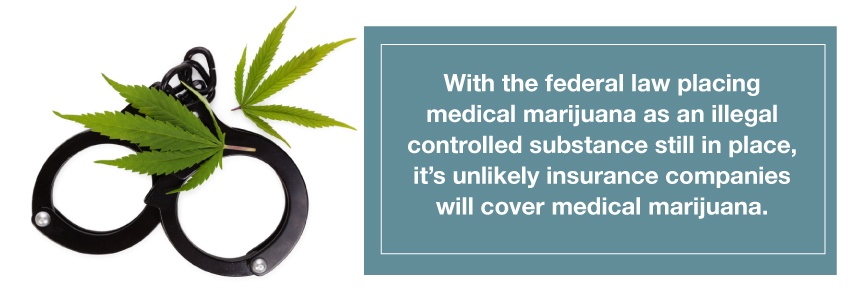Medical marijuana has been shown to be an effective treatment for many different health conditions, ranging from chronic pain to cancer to post-traumatic stress disorder. Although a study found that approximately eight out of 10 doctors approve of the use of medical marijuana and another survey found that 92 percent of patients who use medical marijuana said it alleviates their symptoms, an important question remains: Is medical marijuana covered by insurance?
The short answer is no. One reason is that both recreational and medical marijuana are considered illegal controlled substances under federal law. The Drug Enforcement Administration (DEA) has classified marijuana as a Schedule I drug, defined as having no medical value and a high danger of addiction. As long as this classification is in place, it’s unlikely that insurance companies will cover medical marijuana.
The Food and Drug Administration (FDA) is another barrier to insurance coverage. Generally, insurance companies will not cover a drug that has not received FDA approval. Currently, the FDA has not approved medical marijuana for any indication.

In order for that to happen, an investigator will need to submit an investigational new drug (IND) application to the FDA. The IND will include a thorough overview of the investigators’ qualifications, a proposed plan for human clinical trials for the drug and declaration of the human subjects’ rights and safety. To date, the FDA has not approved a marketing application for medical marijuana.
Although the FDA has yet to take any concrete steps toward approval, the FDA does work with the Drug Enforcement Administration (DEA) and National Institute on Drug Abuse (NIDA) to support clinical research of medical marijuana. Before approval, the FDA will want clinical studies to provide long-term data on the safety and effectiveness of marijuana as a medical treatment.
The Affordable Care Act, health insurance legislation enacted during President Barack Obama’s administration, is administered through federal and state exchanges. These insurance companies will also need to wait until the federal law regarding marijuana is changed and the FDA approves its use. This could be many years away.
In some states, however, change is starting to happen. New York has released an important clarification of insurance law, for example. Insurers in the state will need to cover physicians’ visits relating to medical marijuana, with a few caveats. Obtaining a recommendation for medical marijuana cannot be the sole purpose of the visit. Instead, patients need to be diagnosed with a condition approved for a medical marijuana recommendation. Once they get a medical marijuana card, they can discuss getting a recommendation during one of their doctor’s visits and insurers cannot deny the claim.

Medicaid, Medicare and Marijuana
Medicare and Medicaid are part of the Centers for Medicare and Medicaid Services, which is a federal entity. Being under federal law means that Medicare and Medicaid cannot cover medical marijuana at this time. But it may be advantageous to these programs to cover medicinal marijuana in the future.

A study published in Health Affairs in 2017 found that Medicare could have saved $1.01 billion had medical marijuana been legalized nationally and covered by the government’s insurance program. The savings would have resulted from medical marijuana replacing more costly prescriptions for a variety of ailments.
Additionally, in states that have legalized medical marijuana, Medicare prescriptions for opioids are significantly lower. Prescriptions for morphine dropped by 20.7 percent and hydrocodone prescriptions fell by 17.4 percent in states with medicinal marijuana dispensaries.
If your doctor recommends using medical marijuana and you have either Medicare or Medicaid, you need to pay for the treatment out of pocket. The costs incurred to cover medicinal marijuana will not count toward your Plan B deductible, nor will your Medicare prescription add-on cover it.
If you have health coverage through the Veterans Administration (VA), you may use medical marijuana without fear of losing your benefits. If you currently use marijuana, tell your VA physician so he or she has the best picture of your overall health. If you need a marijuana recommendation, note that VA physicians cannot provide it.
You also cannot ask a VA doctor to recommend you for a marijuana study. And if you do use medical marijuana, you cannot bring it onto VA property per federal laws, which overrule any state statutes.
HSAs and FSAs
Health savings accounts (HSAs) are add-ons to health insurance plans that allow you to pay for things your insurance won’t. These accounts are tax-deductible, and the funds are available to you for everything from co-pays to over-the-counter medications. At the end of the year, whatever money you have in your HSA gets rolled over to the next year.
Another type of health spending account is a flexible spending account (FSA). You start with a percentage of your income in this account at the beginning of the year. Like HSAs, FSAs are used to cover medical expenses your insurance won’t. But these plans are tied to your employer-provided health insurance and you cannot move the money if you change jobs. Additionally, if you have insurance through the Affordable Care Act, you do not have the option of getting an FSA. Unlike HSAs, the money in an FSA must be spent or lost by the end of the year.
Although HSAs and FSAs will pay for doctor’s visit co-pays, they cannot be used to purchase substances the federal government considers illegal, including medical marijuana. Even if medicinal cannabis is legal in your state, you cannot use the money from your HSA or FSA to cover it, though you may be able to use it to pay for physician visits. Check with your HSA or FSA to see if you are allowed to pay for a consultation with a doctor exclusively to get a marijuana recommendation.
If you accidentally misuse your funds, you will have to pay the taxes on what you misused plus an additional 20 percent in penalties when you file your income taxes.
Insurance Coverage and the Courts
Medical marijuana may not be covered by insurance now, but the issue has been addressed in court. In October 2012, the United States Court of Appeals for the District of Columbia heard the case Americans for Safe Access, et al. v. Drug Enforcement Administration. The petitioners brought the case before the court to change marijuana’s drug classification.
The petitioners argued that marijuana should no longer be a Schedule I drug. Changing the drug’s classification would be a significant step toward changing federal marijuana laws and opening the door to insurance coverage. The petitioners had support from 70 medical professionals, according to Insurance Quotes. The court dismissed the case in January 2013.
In 2016, the DEA again reviewed the drug classification of marijuana. Marijuana remains a Schedule I drug, but the agency has taken steps to allow more research into the medical value of marijuana.
In 2017, a New Jersey judge delivered a landmark ruling involving a workers’ compensation case. A lumber worker testified on his legal use of medical marijuana to treat neuropathic pain in one of his hands. The judge ruled that workers’ compensation would have to cover the costs of his medical marijuana. A similar case occurred in Canada. The Nova Scotia Human Rights Commission ruled that an insurance company would have to cover the medical marijuana costs for a man who suffers from chronic pain caused by a car accident.
While neither of these cases has resulted in a change in insurance coverage, they do open the door for a larger discussion and a shift in policy.
The opioid epidemic in the United States is another potential argument for legalization and insurance coverage of medical marijuana. Opioids are a class of painkillers that include hydrocodone, morphine, oxycodone, fentanyl and heroin. Many opioids are legally prescribed, but abuse, addiction and deaths related to these drugs are creating a significant burden. The National Institute on Drug Abuse states:
- In 2015, more than 33,000 people died in the United due to opioid overdose
- Between 21 and 29 percent of patients with an opioid prescription misuse the drugs
- Opioid misuse costs $78.5 billion each year in the United States
Medical marijuana is increasingly being discussed as an alternative to opioids. A physician at Saint Francis Hospital and Medical Center in Hartford, CT, is leading a study that will compare the efficacy of opioids and marijuana as a treatment for acute pain.
Marijuana has the potential to have an impact on the opioid epidemic by serving as an alternative treatment for acute and chronic pain. Additionally, marijuana has been shown to help manage the cravings associated with opioid withdrawal. If enough clinical evidence is amassed to show marijuana’s potential to make a difference in the opioid epidemic, widespread legalization and health insurance coverage may come closer to being a reality.
Medical Marijuana and Insurance Rates
If you elect to use medical marijuana, you could find yourself with higher insurance rates on life and car insurance. Even so, you should never lie on your insurance application form about your marijuana use. Falsifying information could result in an insurance fraud charge or loss of insurance.
As for life insurance: Depending on whether you have a doctor’s recommendation to use medicinal marijuana, you may see a spike in your rates. When you apply for most life insurance policies, you must undergo a health exam, including urine and blood tests. The results from these tests will verify your marijuana use in addition to your overall health. Some insurance providers, such as John Hancock, consider any marijuana smoking to pose the same risk, and warrant the same rates, as tobacco use. Other companies examine your frequency of use and whether your doctor has recommended you use it. Carefully evaluate the policies of the insurance providers you are considering to see their official positions on marijuana use.
Your life insurance company may not necessarily agree with your doctor about whether the severity of your condition requires you to use medical marijuana. If the company does see a need for you to supplement your treatment with medical marijuana, the seriousness of the condition itself could increase your rates. So, even if your marijuana use does not raise your life insurance premiums, you could still pay more because you have a health condition that requires you to pay extra. Prudential, Minnesota Life and SBLI are some of the providers that use your condition to determine your rates if your doctor recommends medical marijuana.
Regarding auto insurance: It covers the car, not the driver. So if you need medical marijuana, your insurance premiums may not increase unless your marijuana use contributes to dangerous driving behaviors.Though proving you were under the influence of marijuana during an accident is difficult, if tests show you were impaired, you could could be charged with Driving Under the Influce (DUI), which covers drugs and alcohol. A DUI raises your premiums an average of 77 percent, second only to a hit-and-run accident.
To avoid this, be responsible and don’t drive if your medicinal marijuana impedes your reaction times or judgment. Follow this same policy with any medicines you might take to keep your auto rates down and avoid accidents.
Dispensaries and Medical Insurance
Marijuana dispensaries currently do not accept medical insurance. This stems from the reason health insurance cannot cover cannabis. The status of marijuana as a Schedule I substance on the federal level results in many organizations, including insurance companies and banks, refraining from conducting business with marijuana sellers. Many dispensaries are cash-only services.
In some areas, though, debit cards are accepted through a third-party company such as CanPay. With these systems, you connect your CanPay account to your bank account and deduct money directly from your bank, as though you used an ATM card. Third-party debit systems circumvent some of the problems banks have with dispensaries. CanPay recently announced a new means of allowing online purchasing of cannabis in states where it’s legal for pickup in a dispensary.
Paying the dispensary directly with credit cards is difficult because major card companies, Visa and Master Card, and banks have declined to allow their services to be used for purchasing cannabis. Whether marijuana is legal in the state doesn’t matter.
What This Means for Patients
The current landscape leaves patients with two choices: pay for medical marijuana out of pocket or use drugs covered by their insurance plan.
Out-of-pocket costs vary greatly depending on how much medical marijuana you need to control your symptoms, the grade of cannabis you purchase and where you live. The average cost for legal marijuana sold by a government program is approximately $15 per gram, according to the Medical Marijuana Association. But if you are purchasing a high-grade strain of marijuana, the price could be as high as $60 per gram.
Costs vary based on what type of marijuana product you want to purchase. Edibles will generally cost $2 to $5 per dose, while bottled tinctures could cost between $15 and $50, according to Cost Helper.
Costs can vary greatly depending on location. Here are the five least and most expensive states for marijuana, according to Forbes.
Least Expensive States for Medical Marijuana (per ounce of high-quality marijuana)
- Oregon: $204
- Washington: $232
- California: $242
- Colorado: $243
- Nevada: $265
Most Expensive States for Medical Marijuana (per ounce of high-quality marijuana)
- North Dakota: $387
- Pennsylvania: $360
- Vermont: $367
- Virginia: $363
- Iowa: $362
Generally, prices are lower in states that have legalized marijuana for medicinal and/or recreational use.
If patients do not want to pay out of pocket or cannot afford the price of medical marijuana in their state, the other option is exploring drugs that health insurance does cover. There are currently some legal, FDA-approved synthetic cannabinoids on the market. These alternatives to medical marijuana include Marinol (dronabinol) and Cesamet (nabilone). As synthetic options, both drugs contain man-made THC, which occurs naturally in marijuana.
Marinol, available as the generic dronabinol, is one legal alternative to medical marijuana. The FDA has approved this drug for treatment of nausea and vomiting related to chemotherapy and as an appetite stimulant in AIDS patients who experience weight loss. Studies have shown this drug does help manage nausea, vomiting and appetite loss.
Cesamet, generic nabilone, is FDA-approved for similar indications. It is prescribed to chemotherapy patients when other anti-nausea medications have failed. Both Marinol and Cesamet are prescribed in pill form. In addition to treating nausea and appetite loss, these drugs can be used to manage pain in people with multiple sclerosis. Last year, the FDA approved a liquid form of dronabinol, also known as Syndros.
Patients will need to check with their insurance policies to ensure that they will cover these particular drugs. Patients should also discuss potential side effects with their doctor.
If patients’ insurance policies do not cover these drugs or this treatment is not effective at curbing pain, opioids may be the next option in pain management. It is important to weigh the potential side effects against the benefits.
Opioids can be highly addictive, particularly when used over long periods. Opioids are at an elevated risk for abuse. Approximately 4 percent to 6 percent of patients who abuse prescription opioids eventually turn to heroin, and 80 percent of heroin users started by abusing prescription opioids, according to the National Institute on Drug Abuse. Opioids can be responsibly prescribed and used, but patients should always be aware of the risks.
When you are deciding whether to pay for medical marijuana out of pocket, consider all your options and talk with your doctor to find the best choice for you.
Weighing the Cost of Medical Marijuana
Though patients pay out of pocket for medicinal marijuana, this option may still cost less than prescription drugs, especially when comparing cash payments. Even insurance does not always cover the complete cost of a medication. The discounted price with insurance for many of these drugs could be higher than the cost of medicinal marijuana from a dispensary.
The epilepsy drug Epidiolex, a cannabis-derived medication manufactured by GW Pharmaceuticals and approved by the FDA in 2018, cost $32,500 annually. Even if insurance covers some of the costs, a patient could still pay between $60 and $2,400 a year.
GW also makes Sativex (nabiximols) which has yet to receive FDA approval for its blend of equal parts THC and CBD. This drug is used to treat multiple sclerosis spasticity. Prices for this drug cannot be determined until it receives FDA approval for use in the United States. As a proprietary blend, it may have a similarly high cost to Epidiolex.
The synthetic cannabinoid Marinol also has a high price tag. For 60 2.5-milligram capsules, this drug costs $692. For 10-milligram capsules, the cost increases to $2,622 for 60 doses. Purchasing the generic version of this drug saves some money, but medicinal marijuana may still cost less. Dronabinol costs between $93 and $256 for a 60-count bottle of 2.5-milligram capsules. The range accounts for differences in prices between generic manufacturers and pharmacies. All prices indicate the cash amount when paying without insurance.
The Cost of a Marijuana Recommendation
The cost of a doctor’s visit to acquire a marijuana recommendation could be covered, depending on where you live.
In New York, for instance, insurers who typically cover regular doctor’s visits must still cover those visits, even if they result in a recommendation for medical marijuana. Companies, though, are not required to pay for doctor visits made for the purpose of getting a marijuana recommendation. Always be honest with the physician’s office about your reasons for making an appointment, even if it results in having to pay for the visit. Truthfulness will prevent insurance fraud allegations or problems with the insurance company.
In most states, purchasing medical marijuana requires a doctor’s recommendation or certificate to be placed in a state database of those approved to purchase cannabis. Being in this database makes it possible to legally obtain marijuana for medical reasons in the state. The status requires regular renewal, which means returning to the doctor for follow-up visits.
If you need doctor visits to continue to take medical marijuana and your insurance won’t cover the visits, what should you do? To save money on out-of-pocket costs, ask your doctor’s office for a cash discount. Some will offer these. Or discuss a payment plan with the office. If you live in a state like New York where insurance covers general physician visits even if you get a marijuana recommendation, see if you can combine appointment needs. If you have a chronic condition that requires marijuana for treatment or management, you likely will need to see your doctor on a regular basis for physical exams and wellness visits. Talk to your insurance company to see if such appointments are covered.
Looking to the Future
The status of insurance coverage of medical marijuana could change years from now or sooner than expected. More states are legalizing not only medical marijuana but also recreational marijuana because of the potential for significant revenue.Colorado generated $200 million in tax revenue in a single year, while Washington generated $256 million, according to the Los Angeles Times.
Workers’ compensation has already been directed to cover medical marijuana. This might be the first place we see widespread coverage.
Employer-based insurance plans could be next. These plans are small compared to large national insurance companies. The size of these plans allows them a greater degree of flexibility.
If national plans were to offer coverage, they might simply decide to cover medical marijuana as they would any other drug. Alternatively, insurers could cover cannabis under a prescription plan. These plans operate separately from a patient’s main insurance policy and cover only the cost of prescription drugs.
If patients could use their insurance to help pay for their medical marijuana, there are issues to consider. Insurance companies would have the ability to raise premiums, citing the cost of covering a patient who needs an expensive drug.
Greater employee protection is another possibility in the future. Currently, employers in many states have the option to rescind a job offer if a potential employee tests positive for marijuana.
In some states that have legalized medical marijuana, employees who are authorized to use medical marijuana cannot be fired for testing positive on a drug screening. But those protections are not universal. If medical marijuana receives FDA approval and coverage from large, national insurers, more protections for medical marijuana patients may follow.
If you have decided medical marijuana is the right choice to help you manage your symptoms, the next step is finding the right doctor and dispensary to meet your needs. Search to find a physician or dispensary near you. Sign up for our newsletter to keep on top of the latest medical marijuana news. We are here to help you get the medical treatment you need.
Resources:
- https://www.ncbi.nlm.nih.gov/pubmed/29610897
- https://medicare.com/coverage/medical-marijuana-medicare-coverage/
- https://www.drugs.com/price-guide/marinol
- https://www.healthaffairs.org/doi/abs/10.1377/hlthaff.2016.1135






